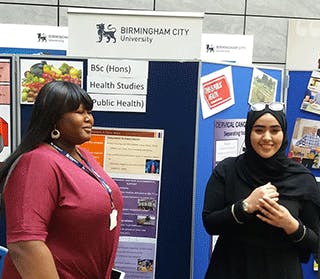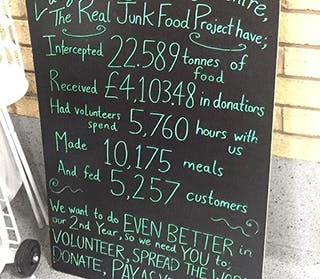STUDENT LIFE LAST UPDATED : 15 MARCH 2017

Health Studies (Public Health) BSc Hons students are always encouraged to engage in local initiatives and public health work wherever possible; all students have the opportunity to do this as part of their work placements during their course.
This year students chose to take part in a popular project - The Real Junk Food Café.
What is The Real Junk Food Café?
The Real Junk Food Project (TRJFP) Birmingham is a fast-developing community development project located across the city. Tackling food insecurity in Birmingham, the project takes "junk" food (produce past it's sell-by but not use-by date) before it is thrown into landfill and turns it into meals. Operating four cafes, numerous events and a community Sharehouse, the project intercepts hundreds of tonnes of unsold food every year and uses it to feed thousands of people.

How students got involved
Students and lecturers wanted to raise awareness of Public Health in general, as well The Real Junk Food Café, so decided to run a one day event at City South campus to expose others to the work they do. Students also had the opportunity to visit the cafés and met the people who the café benefited, which was a real eye-opener for many students and a part that they most enjoyed.
What happened during the event
Food tasting was available to show others the quality of the food they serve in the cafés as well as students, lecturers and representatives from TRJFP Birmingham answering questions and sharing information.
The students also ran a game called "The Spice Journey", which was delivered alongside the food tasting provided by TRJFP Birmingham. Hosted by the BCU Network for Research on Food, which sees researchers and PhD students collaborate on projects cross-faculty, The Spice Journey provided staff and students with the opportunity to learn about the origin, both geographic and cultural, of the foods they love. Identifying food miles in the process (the distance travelled for food to reach the dinner plate), the experience of guessing the physical origins of spices gave participants the chance to reflect on the benefits of both the globalised food system and local produce.
Learning outcomes
Public health students wanted to establish the role of their profession in the wider context of the health workforce. By interacting with students and academics from other health professions, the public health students were able to define their role in the future of health and wellbeing at local, national and global levels.
They explained their future profession and its relationship with other professions such as nursing and radiology to students studying those courses. The public health students gained first-hand experience in community development and health communications by disseminating information about a local partner organisation that tackles food insecurity in Birmingham, and made other students aware of the services the organisation provides.
How we measured our success
Four public health students were involved in the development of resources and delivery of the event. They asked students and staff to provide feedback in the form of anonymous post-it notes; such notes detailed what passers-by had learnt about the public health professions, health promotion, local initiatives and the role of BCU in promoting this field of study. Overwhelmingly positive responses indicated that the public health students had heightened institutional awareness of the role of public health, the students who study our courses and the type of work public health practitioners do.
In the coming academic year, students will again be invited to work with local community development projects to deliver events that heighten awareness of their profession and it's relation to the wider health workforce. Students will be asked to provide their ideas about how this might work.
We hope that you choose us to study your Health Studies (Public Health) degree. Like us on Facebook.